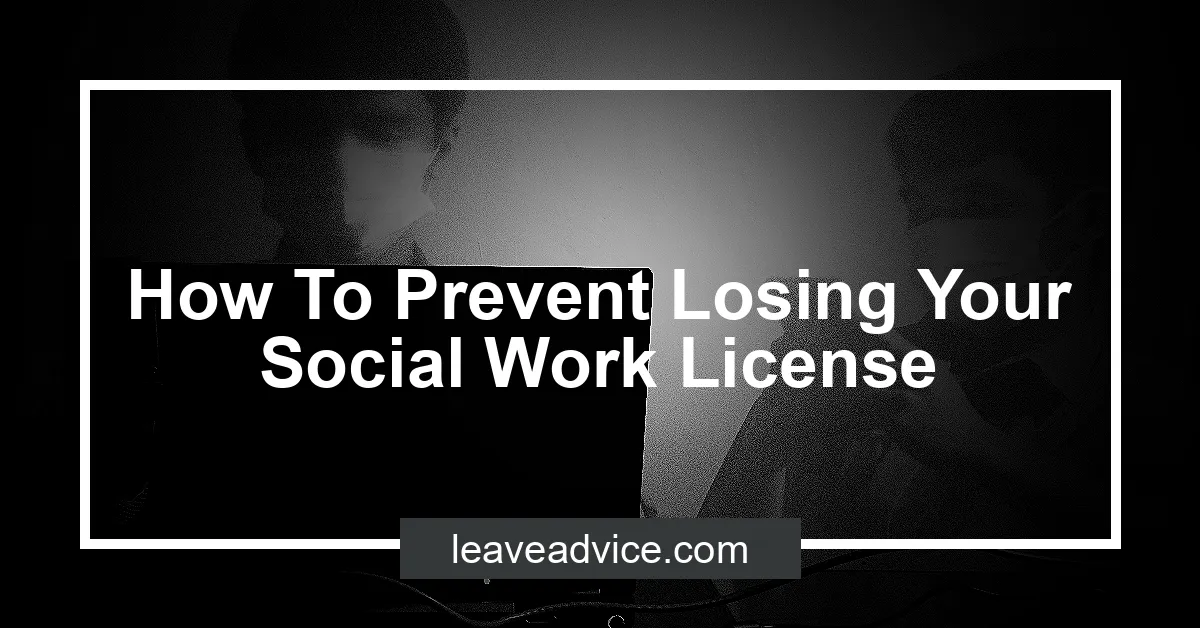How To Prevent Losing Your Social Work License


As a social worker, it is crucial to adhere to high ethical standards. Failure to comply with these standards can result in the revocation of your license.
In this article, we will explore the common reasons why social workers may lose their license and provide recommendations on how to avoid these pitfalls.
Acting Outside the Scope of Your License
One of the ways social workers can lose their license is by acting outside the scope of their license. It is essential to understand the limitations of your license and ensure that your actions are within the boundaries defined by your profession.
Engaging in activities that are not authorized by your license can cause severe repercussions and put your professional standing at risk.
Unprofessional Conduct
Maintaining professional conduct is of utmost importance for social workers. Any behavior that reflects negatively on your professionalism can lead to the loss of your license.
This includes engaging in inappropriate relationships with clients, neglecting your responsibilities, or abusing your position. It is crucial to always prioritize the well-being and best interests of your clients to maintain a high level of professionalism.
Criminal Convictions
Having a criminal conviction can also result in the revocation of a social worker’s license. Social workers are expected to uphold the law and act as advocates for their clients.
Any criminal activity can undermine the trust and credibility of a social worker and may lead to the loss of their license. It is essential to maintain a clean record and avoid engaging in any unlawful activities.
Fraud, Abuse, Neglect, or Exploitation of Clients
Fraud, abuse, neglect, or exploitation of clients are serious offenses that can lead to the loss of a social worker’s license. Social workers have a duty to protect and support their clients, and any form of mistreatment or exploitation is strictly prohibited.
It is imperative that social workers always act in the best interests of their clients and maintain a strong ethical foundation in their practice.
How to Avoid Losing Your License
To avoid the risk of losing your social work license, there are several steps you can take:
-
Stay within the boundaries of your license. Be aware of the limitations and responsibilities defined by your profession and ensure that your actions align with these guidelines.
-
Maintain professionalism at all times. Treat your clients with respect, maintain appropriate boundaries, and prioritize their well-being.
-
Stay informed about ethical standards and legal requirements. Keep up-to-date with any changes or updates in the field of social work and ensure your practice aligns with the latest regulations.
-
Seek supervision and support. Engage in regular supervision with experienced professionals to ensure you are providing the best possible care for your clients and to address any ethical or professional concerns.
-
Stay accountable. Reflect on your practice regularly, seek feedback from colleagues and clients, and be open to continuous learning and improvement.
Remember, losing your social work license can have severe consequences for your career and professional reputation. By adhering to ethical standards, maintaining professionalism, and prioritizing the well-being of your clients, you can significantly reduce the risk of losing your license.
Recommended Product: Professional Ethics in Social Work


As a social worker, it is crucial to have a deep understanding of professional ethics in your practice. One highly recommended resource is the book “Professional Ethics in Social Work.” This comprehensive guide provides insights into ethical decision-making, boundary issues, and maintaining professionalism in the field of social work.
By familiarizing yourself with the principles outlined in this book, you can strengthen your ethical foundation and reduce the risk of losing your license.
In conclusion, social workers are held to high ethical standards, and failure to comply can result in the loss of their license. It is essential to stay within the scope of your license, maintain professionalism, and avoid engaging in any behavior that may compromise the well-being of your clients.
By following these guidelines and staying informed about ethical standards, you can safeguard your license and continue to make a positive impact in your field.
(Note: The recommended product “Professional Ethics in Social Work” is a well-known and highly regarded resource in the field. It provides valuable insights and guidance on navigating the ethical complexities of social work practice.)






